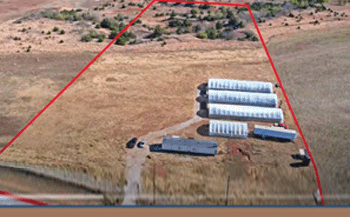10-04-2023 TARA MERGENER
It’s no secret that Oklahoma’s farmland is changing hands rapidly, and not for the traditional crops of wheat, corn, or cotton. Since the legalization of medical marijuana in the state 5 years ago, Oklahoma’s farmland has become a hot commodity for those looking to grow cannabis, with a significant number of these buyers being foreign investors, primarily from China.
Oklahoma, once celebrated for its picturesque landscapes and fertile fields, has sustained generations of farmers with income and provided Americans with essential food.
However, the Oklahoma fields of green are now a sought-after real estate commodity, generating interest from around the world.
Foreign investors, with 80% of them hailing from China, are flocking to the heartland of America.
“They’re bringing in suitcases full of cash to purchase farmland,” notes Sheriff Dennis Banther of Kingfisher County.
MUST SEE China Moves to Dominate World Food Supply: ‘Food Is Power’
The rapid transformation of Oklahoma’s farmland is closely linked to the booming medical marijuana industry. Oklahoma, which approved a medical marijuana proposal in 2018, is one of the most permissive in the country. This approval set off a land rush that gained momentum during the COVID-19 pandemic when the state remained open for business while others locked down.
“A medical marijuana growers’ license allows businesses to legally cultivate marijuana for medical purposes in Oklahoma,” explains Mark Woodward, spokesman for the Oklahoma Bureau of Narcotics. However, this surge in demand for licenses led to an increase in black-market operations, often run by criminal organizations.
“They would advertise on Mandarin websites saying come to Oklahoma, grow marijuana, millions of dollars to be made,” Woodward adds.
“Criminals are paying locals or lawyers to buy it for them,” warns farmer John Emmerich, because land sales to non-U.S. citizens in Oklahoma are prohibited. Currently, 3,000 of the state’s 6,400 marijuana operators are under investigation for obtaining licenses illegally, selling black market weed, or both.
READ China Is Operating Illicit Police Stations Inside the US – Why Are They Still Allowed to Be Here?
“Each time we’ve hit one of those farms, it’s really a smaller part of a much bigger investigation tied to 40 to 400 other farms in Oklahoma, which are all being run by a higher group of people that are moving the plants, moving the workers, and more importantly making the money disappear for the Chinese or the Mexican Criminal Organizations or the Russians,” said Woodward.
While pot shops buzz on every corner, legal retailers like Brandon Karcho insist that the shadowy underworld of weed is undercutting business and risky for customers.
“They don’t have to follow the regulations we have to follow, and they don’t have to pay the taxes that we have to pay. It hurts us,” he said. “Every rule is in place for a reason…You don’t know what’s going to happen. You don’t know what you’re getting.”
Despite a recent failed attempt to legalize recreational marijuana, the state that has now been dubbed “Tokelahoma” shows no signs of slowing down, while farmland disappears at an alarming rate.
“You’ve got citizens who would like to see things corrected…It’s the almighty dollar. They tax marijuana at a higher rate and they want that money. We’re starting to lose our morals and our values in the efforts of trying to get more money,” Sheriff Dennis Banther said.
As the state grapples with the consequences of its medical marijuana program, it faces challenges in regulating the industry, tackling illicit operations, and addressing the impact on communities. With the Wild West of weed showing no signs of being tamed, the future of Oklahoma’s farmland remains uncertain.
MUST SEE:
National Security Risk? Lawmakers Push Back as China Tries to Buy Land Near US Air Force Base
China’s Confucius Classrooms in US Public Schools: Are They Brainwashing America’s Children?
